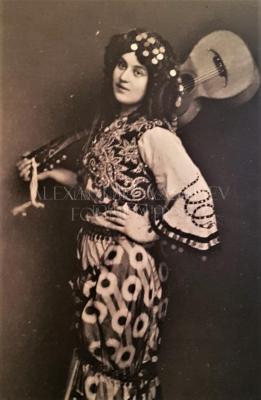
Marina VESCHITZKAYA (Russian, 1922 - 2020 Paris)
Marina VESCHITZKAYA is a Russian cabaret singer in Paris, born in May 17, 1922 in Moscow, Soviet Union and died 19 November 2020 in Paris.
Her father, Oscar Adolfovich VESCHITZKY was born in Poland in 1879. He was a civil engineer during the first two decades of the Soviet Union, but was arrested on Saturday, August 7, 1937. 13 days after his arrest, he was shot at the Butovo NKVD training ground near Moscow.
Her mother, Varvara Petrovna CHAMCHEVA, a talented singer in Moscow theaters, was a relative of Peter WITTGENSTEIN, General-Field Marshal of Russian army during the war with Napoleon I in 1812. Varvara changed her stage name STRADOVA, becoming ORLOVA after the arrest of her husband.
Marina's brother, Pavel Oskarovich (1913 - 1992), was a talented teacher, composer, accompanist for the outstanding singers Nadezhda OBUKHOVA and Ivan KOZLOVSKY, the author of the famous "Self-Study Guide for Playing a Six-String Guitar".
After the execution of her father, sixteen-year-old Marina had to go to work at the Moscow State Circus. There she received the nickname "Wasp" for her slimness and thin waist.
"Wasp" was tap dancing between acrobatic numbers. Before the war, Marina worked at the All-Union Concert and Touring Association and gladly traveled throughout the Soviet Union with dance numbers. With the beginning of the war, she rejected the offer to perform and enjoy the privileges of the NKVD ensemble and asked to perform on the front line, which was already nearby, to dance with her partner Alexandre, who died during an air attack, and Marina herself was shell-shocked.
After this incident, Marina did not want to look for a new dance partner, but decided to sing at the front herself. Her mother, a professional singer, has been giving her singing lessons since childhood. On December 5, 1941, when the Soviet army launched an offensive along the entire Moscow front, for the first time in six months of the war, the largest defeat was inflicted on the enemy. Marina VESCHITZKAYA was awarded a certificate of honor and a memorable gift - the perfume "Red Moscow". Over time, well-deserved medals shone on her tunic.
Concerts for senior officers were held in warm dugouts with electric lighting. This luxury, almost forgotten in the war, relaxed Marina so that, forgetting about the war, she sang about love, earning the praise of Marshal ROKOSSOVSKY himself. She also happened to be at the same table next to Nikita KHRUSHCHEV, just before her last severe contusion in 1945, close to the end of the war.
After the war, Marina was singing in different traditional groups and was close to the whole family of a talented Alyosha Ivanovich DMITRIEVICH, a Russian singer of gypsy origin, a figure in the Russian emigration, and sometimes performed with them.
In 1976, she managed to get permission to visit her aunt (mother's sister) in Canada. Marina took the opportunity to look at Paris and visit her old friends DMITRIEVICH's. Russians often gathered in their hospitable home. Among them was Eugene Nikolaevich IVANOFF, an erudite engineer, translator who spoke ten languages. Thus began her new life, confirmed by a French passport. Her husband adored her, pleased her, pampered her, but most importantly he understood that his wife was an artist who needed to sing. Eugene sold his house and opened for Marina the restaurant "The Palace of Pancakes" in the 17th district of Paris.
After the death of Eugene IVANOV in 1986 Marina had to part with the "Palace of Pancakes" and perform in "Balalaika", "Tsarevich", "Izba", and sometimes she was invited by Ludmila LOPATO to her magical "Pavillon Russe". In the 1990s she performed and singed in Paris with Aleksandr Sergeyevich ZATSEPIN, famous Russian composer and musician.
In the spring of 2007, Marina VESCHITZKAYA was invited to Moscow to the "Pyotr Leshchenko Festival of Music and Song of the Russian Abroad". She was the first in the festive program.
She died November 19, 2020 in her apartment at 769, avenue du General de Gaulle at Boulogne Billancourt, also nicknamed "Teremok" because of its particular Russian atmosphere and decoration.
Loading...